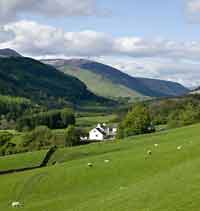Scots split over re-targeting of CAP support

The split among Scottish farmers over how best to support beef and sheep production in upland areas shows no sign of abating.
A government consultation into the use of the so-called Article 68 measure – part of the CAP “health check”, which allows direct payments to be taken from one group of producers and targeted at others – is due to close on Friday (15 May).
But, after a meeting of producer interest groups in Edinburgh on Tuesday (12 May), it seems that the industry is as divided as ever.
Rural affairs secretary Richard Lochhead has proposed making full use of Article 68. His plan is to scrap the Scottish Beef Calf Scheme, top-slice 10% from everyone’s single farm payments and transfer the funds (about £47m) to top up existing SFPs in areas suffering from destocking of cattle and sheep.
After the meeting on Tuesday, the National Beef Association issued a statement saying it favoured the use of Article 68 to top-slice 10% off all SFPs. But it also wanted to retain the Scottish Beef Calf Scheme – worth about £19m – with the remaining £28m funds targeted at livestock producers in the hills.
“We see this as the best way of giving most assistance to as many of Scotland’s active hill farmers as possible and thereby protecting our country’s most vulnerable agricultural operations,” said NBA Scotland vice-chairman Hamish McBean.
The idea has also been advocated by the National Sheep Association in Scotland “to address the serious decline in breeding ewe numbers”.
But the government’s plan has been attacked by NFU Scotland, which sees it as effectively “robbing Peter to pay Paul”. “The proposal risks destabilising the dairy and cereal sectors, as well as significant parts of the sheep and beef sector,” said a statement.
NFUS agrees that the Scottish Beef Calf Scheme should stay. But it is concerned that simply using the remaining £28m to top up SFPs in high risk areas will do nothing to increase stocking levels.
This is because the Article 68 rules mean that this extra money has to be decoupled from production, so there is no need to actually be an active producer to claim it. There is nothing to stop a producer in a high risk parish, who receives this uplift in his payment, selling his entitlement or stock the following day.
“This could be seen politically and publicly as ‘money for nothing’ and could actually accelerate the exodus from the industy,” said NFUS president Jim McLaren.
A survey by NFUS this week found that 83% of members were against the use of Article 68.
Instead, NFUS is recommending better targeting of funds within the Land Managers Options under the Scotland Rural Development Programme.
- For a Farmers Weekly comment on this story, see Phil Clarke’s Business Blog
